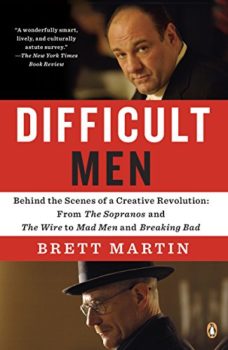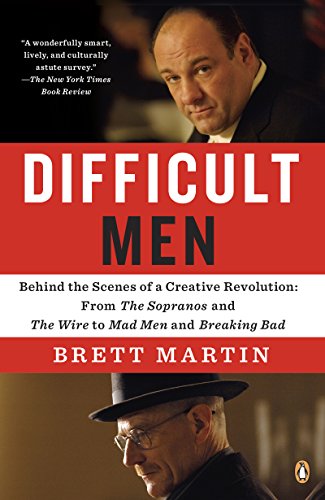
Chances are, if you have any tolerance at all for television, you’ve watched at least one of the signature dramatic shows that have cropped up on cable during the past decade. I certainly have. I’m a sucker for this stuff, and I didn’t fully understand why until I read Brett Martin’s Difficult Men, a superbly constructed tribute to these programs and their creators. Yes, here for all us television fans is a book about Breaking Bad and our other favorite series.
Estimated reading time: 4 minutes
Martin argues that The Sopranos, The Wire, Mad Men, Breaking Bad and a few other high-quality TV shows are “the signature American art form of the first decade of the twenty-first century, the equivalent of what the films of Scorsese, Altman, Coppola, and others had been to the 1970s or the novels of Updike, Roth, and Mailer to the 1960s.” His thesis is hard to argue with, and I say that having devoured much of the output of those filmmakers and writers.
Difficult Men: Behind the Scenes of a Creative Revolution—From The Sopranos and The Wire to Mad Men and Breaking Bad by Brett Martin ★★★★★
Difficult Men dwells largely on the creators of those four celebrated dramas—David Chase (The Sopranos), David Simon (The Wire), Matthew Weiner (Mad Men), and Vince Gilligan (Breaking Bad)—plus a few others, especially Alan Ball (Six Feet Under) and David Milch (Deadwood). If you’ve watched any of these programs, you will easily agree with Martin’s assertion that their protagonists “belonged to a species you might call Man Beset or Man Harried—badgered and bothered and thwarted by the modern world.” As Tony Soprano said, encapsulating the meaning of life for all these men, “’Every day is a gift. It’s just . . . does it have to be a pair of socks?’”
The conceit in Martin’s title derives from the indisputable fact that Chase, Simon, Weiner, Gilligan, Ball, and Milch collectively possessed enough neuroses, inner conflicts, self-doubts, disappointments, psychological wounds, and personality quirks to match the six leading men of the dramas they brought to the screen. In short, Tony Soprano and Don Draper have nothing on these guys—and Martin amply demonstrates that by recounting the sometimes colorful but excruciatingly frustrating paths most of them followed to sell their shows to HBO, FX, and AMC.
The writers all deserve to be called “difficult men”
At least one of the six, David Milch, would qualify for the Neurotics’ Hall of Fame. Martin describes the time when a writer on one of his shows arrived for his first day of work “to see a man in the second-floor window peeing on the flowers below. ‘Oh, must be Milch,’ the receptionist told him.” Milch had (and presumably still has) a reputation as a genius, but he tended to drive everyone working with him around the bend. “At some point,” Martin reports, “Milch stopped committing scripts to paper at all, preferring to come to set and extemporaneously dictate lines to the actors.” Can you imagine being one of those actors?
Martin draws an interesting parallel between these contemporary serialized television dramas and the work of the Victorian writers—Charles Dickens, Anthony Trollope, George Eliot, and others—who gained the 19th century equivalent of superstardom on the strength of their serialized novels. In both cases, format enabled artistry, allowing the creators to develop complex, fully fleshed characters and story arcs that weren’t limited by the 42-minute stricture of today’s network-TV “one-hour” dramas.
The most fascinating chapter in this book about Breaking Bad
To my mind, the most fascinating chapter in Difficult Men is the last one before the epilogue. Martin describes sitting for days on end in the writers’ room for the show Breaking Bad along with creator (called “showrunner”) Vince Gilligan and his crew of very gifted and extravagantly paid screenwriters. That chapter alone is worth the price of the book. You’ll never look at TV drama again the same way if you read it.
Difficult Men is a well organized, skillfully crafted, and insightful look at one of the most-watched cultural phenomena of our time.
According to his website, Brett Martin is a correspondent for GQ. His work has appeared in Vanity Fair, The New Yorker, The New York Times, Bon Appétit, Food & Wine, and many others, as well as on public radio’s This American Life.
For related reading
Like to read books about business? Check out My 10 favorite books about business history.
If you enjoy reading nonfiction in general, you might also enjoy:
- Science explained in 10 excellent popular books
- 10 great biographies
- Top 10 nonfiction books about politics
And you can always find my most popular reviews, and the most recent ones, on the Home Page.



























